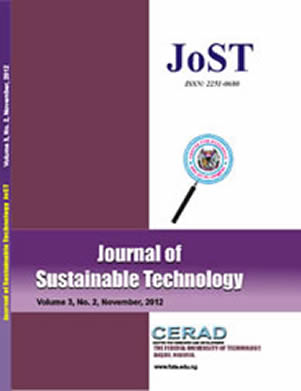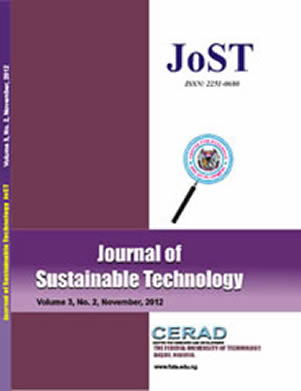The stiff competition between man and livestock for scarcely available feed resources poses a cost challenge to monogastric production in Nigeria. To overcome this challenge, the option of sourcing for cheap alternatives appears attractive. Cocoa pod husk has the potential of becoming an important, cheap and locally available feed resource when properly harnessed. A feeding trial was conducted to evaluate the effect of dietary inclusion of cocoa pod husk on the performance and economy of weaner pigs. Eighteen Crossbred (Large White x Landrace) pigs between the ages of 6-8weeks with an average initial weight of 8.93kg were assigned to three dietary treatments with six animals, each being a replicate in a completely randomized design (CRD). Dietary treatments consisted of control (treatment A) which was without cocoa pod husk (CPH) treatment B having maize cob ash treated cocoa pod husk (MCACPH) and treatment C containing untreated cocoa pod husk (UCPH). Dry matter, crude protein, crude fibre, ether extract, ash, nitrogen free extract, feed intake, weight gain and economics were determined. The maize cob ash treated cocoa pod husk and untreated cocoa pod husk had 83.35% and 87.78% dry matter, 7.90 and 7.81% crude protein, 11.16 and 18.00% crude fibre, 1.50 and 3.58% ether extract, 9.81 and 6.01% ash and 52.78 and 53.39% nitrogen free extract respectively. Dietary treatments did not significantly (P>0.05) affect feed intake and body weight gains. Feed convertion ratio value was highest for control (3.33) followed by treatment C (2.58) while treatment B was least (2.41). The same trend was observed for feed cost per kilogram gain indicating improved efficiency of feed utilization and cost reduction with inclusion of CPH moreso with MCACPH. The best feed cost/kg gain and cost saving was observed in treatment B. The results suggest that MCACPH improved performance and was cost effective for feeding weaner pigs.
PAPER TITLE :PERFORMANCE AND COST EFFECTIVENESS OF FEEDING MAIZE COB ASH TREATED COCOA POD HUSK DIET TO WEANER PI
JOURNAL Of SUSTAINABLE TECHNOLOGY | VOLUME 3 NUMBER 2 2012
Paper Details
- Author(s) : AYUK, A.A., ANYA, M.I., OKON, B.I., WOGAR, G.S.I., OKON, B., and AKPAN, B.J.
- Abstract:



